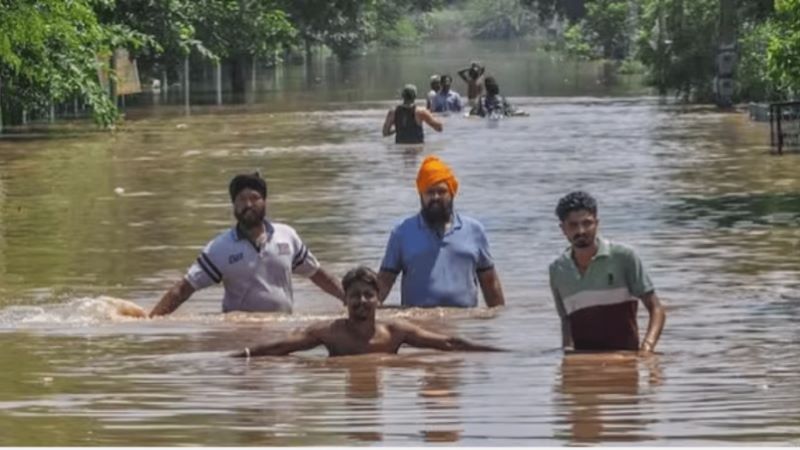 Punjab is currently grappling with a devastating flood situation that has left thousands of residents struggling for their survival and safety. Persistent rains over the past 48 hours have caused severe flooding across villages in multiple districts throughout the state, creating widespread chaos and disruption to daily life. The floodwaters have inundated homes, destroyed crops, and forced families to evacuate their residences, leaving behind their belongings and livelihoods. The situation has become so critical that the Meteorological Department has predicted heavy rain for the next few days, indicating that the crisis is far from over.
Punjab is currently grappling with a devastating flood situation that has left thousands of residents struggling for their survival and safety. Persistent rains over the past 48 hours have caused severe flooding across villages in multiple districts throughout the state, creating widespread chaos and disruption to daily life. The floodwaters have inundated homes, destroyed crops, and forced families to evacuate their residences, leaving behind their belongings and livelihoods. The situation has become so critical that the Meteorological Department has predicted heavy rain for the next few days, indicating that the crisis is far from over.
The impact on education and daily life has been immediate and severe. Recognising the gravity of the situation, Punjab Chief Minister Bhagwant Mann announced the closure of all schools in the state from August 27 to 30, 2025, acknowledging the flood threat and prioritizing student safety. However, this decision also highlights the extent to which the natural disaster has disrupted normal life across the state. Families are not only dealing with physical damage to their properties but also the psychological stress of uncertainty about when normalcy will return.
In a striking display of questionable priorities, Chief Minister Bhagwant Mann was notably absent from Punjab during this critical time, instead choosing to attend a ceremonial event in Chennai. On August 26, precisely when his state was battling the flood crisis, Mann joined Tamil Nadu Chief Minister M.K. Stalin for the launch of an expansion of the Chief Minister’s Breakfast Scheme to government-aided primary schools in urban areas. While educational initiatives are important, the timing of this visit raises serious questions about leadership priorities during a state emergency.
The contrast between the Chief Minister’s activities and the ground reality in Punjab is deeply troubling. While Mann was participating in photo opportunities and ceremonial launches in Chennai, Punjab residents were wading through floodwaters, evacuating their homes, and seeking shelter from the relentless rains. Villages across multiple districts were submerged, farmers watched their crops get destroyed, and families faced the prospect of losing their homes and possessions. The absence of the state’s highest elected official during such a critical time sends a message that ceremonial duties take precedence over crisis management.
This situation exemplifies a broader issue of political leadership failing to prioritize the immediate needs of their constituents during emergencies. When natural disasters strike, people look to their leaders for reassurance, coordination of relief efforts, and visible commitment to resolving the crisis. Instead, the people of Punjab were essentially left to fend for themselves while their Chief Minister attended what can only be described as a non-essential event in another state. The timing could not have been worse, as the flood situation required immediate attention, resource allocation, and on-ground leadership.
The people of Punjab deserve better from their elected representatives. During times of crisis, leadership means being present, accessible, and fully committed to addressing the immediate needs of those affected. While government officials and disaster management teams continue their relief operations, the symbolic importance of the Chief Minister’s presence cannot be understated. Natural disasters require not just administrative response but also political leadership that demonstrates solidarity with the affected population. Unfortunately, the people of Punjab were left feeling abandoned at a time when they needed their leader most, highlighting a concerning disconnect between political priorities and public service responsibility.